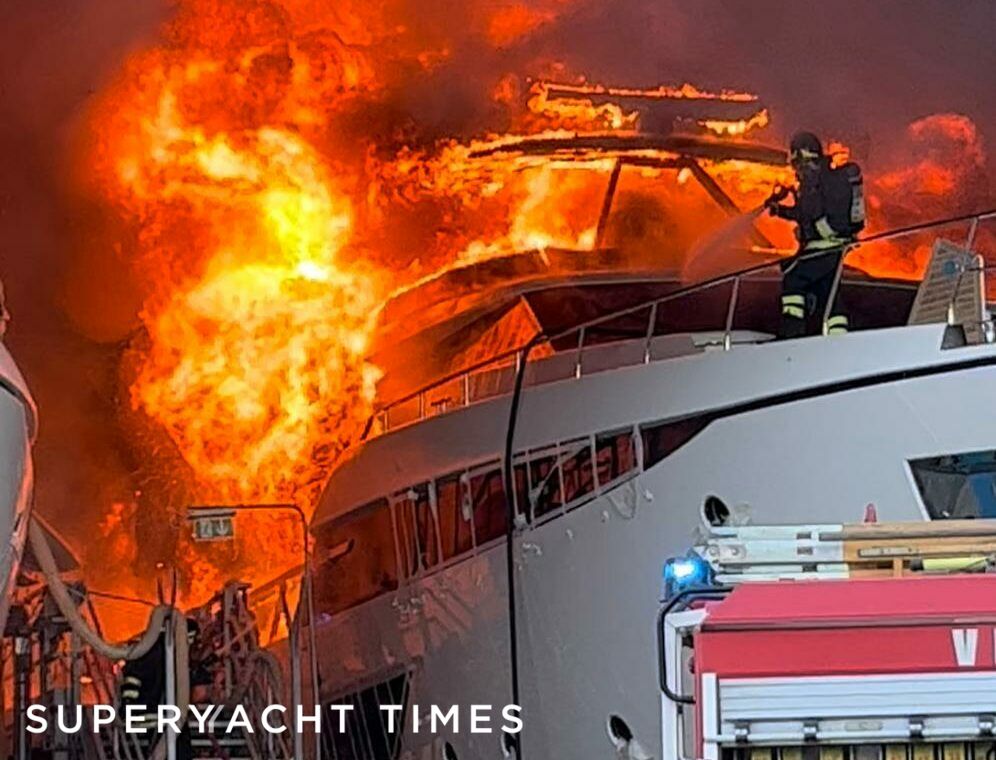Fires are unfortunately a serious issue in yachting. This year alone we’ve lost around 15 motor yachts in the 24-metre and above category, including the brand-new 43.7-metre ISA superyacht Aria SF, which caught fire and then sank within the first month of her delivery.
As with any incident, there isn’t a single cause and therefore a single solution to eradicate the risk. But there are a number of precautionary measures that owners can take, to lower the risk of fire. SuperYacht Times caught up with Pantaenius Yacht Insurance to learn more about these preventive measures, and to learn the best ways to mitigate the risk of fire. 
There is a long list of possible factors but we are regularly witnessing defects of the electrical installations onboard that cause a fire. The reason is often that electrical equipment is installed without sufficient space and the ventilation is not adequate or properly designed, especially in the engine room where this is an obvious problem.
Neglected maintenance of all electric installations is a possible problem as well. Owners who want to cut down on costs should never consider saving money at the expense of their own safety. Depending on the size of the yacht, the pantry, galley or kitchen provides a certain potential for fire as well. Gas stoves, for example, need to be checked on a regular basis to prevent defects.
In the event of an accumulator fire, a heavy smoke is produced first, which descends downwards. One of the biggest problems we discovered in this context is that alarm systems such as smoke detectors are sometimes very basic, work pretty slowly and are located in the wrong places. This can reduce the crew’s time to react significantly, even if they are onboard. Of course, having enough qualified crew onboard is a major requirement in matters of fire prevention. There are often dozens of yachts lying tightly together in marinas without enough, or any, crew onboard. If one yacht catches fire, it is very likely that two or three other vessels will be damaged as well.
Lithium batteries are not dangerous per se. Yes, they offer a considerable potential danger and in the case of an actual battery fire, it is usually impossible to get it under control with conventional extinguishing agents, such as hand-held fire extinguishers. However, the real problem usually lies in improper use or installation. There are already a number of construction regulations for permanently installed lithium batteries, which would certainly have to be supplemented in one place or another.
However, it is the mobile batteries that cause us greater concern, as these are not initially designed for use onboard and many yachts do not have appropriate provisions to enable safe charging onboard. This includes, for example, suitable early warning and extinguishing systems but also safety boxes that have a separate charging management system. Ultimately, crews and captains need to be made aware of the very real and possibly life-threatening risks.
Technical defects are the most common cause. However, these are usually caused by improper use or improper installation. We therefore see crews and especially captains as having a great responsibility. They can only fulfil this responsibility through appropriate training.
Are electric water toys a risk and, if so, how can we ensure the toys we buy are safe?
Owners should seek advice on how to equip a yacht to safely load and store toys onboard. However, we also see the manufacturers of toys and not least the shipyards as having a responsibility to deal with the problem in a transparent manner and to react accordingly. This is how panic can be avoided. Because once again: lithium batteries per se are safe. However, they cannot be used and installed as desired.
equipment. These are charged onboard, but often in unsuitable places, without supervision and in the worst case, they are already in a damaged condition. Cases like the 41-metre motor yacht Kanga illustrate the problem quite clearly, but are by no means rare anymore.
Read: Kanga fire report: How safe are Li-ion batteries aboard yachts?
A client should look for a CE test seal, charge only with intended accessories, never leave them unattended, and ideally charge them in a safety box specifically designed for charging lithium batteries,with a charge management system and integrated extinguishing agents. They should also refrain from charging damaged batteries. This therefore requires regular checking.
We haven’t insured any hydrogen-powered yachts yet. So there is no evidence yet to rely on. However, we are following the technical development very closely. Currently we’re keeping an eye on hydrogen-powered superyachts being planned at Lürssen and Meyer Papenburg.
Do you offer variable coverage/protection plans for different systems (lithium, hydrogen, etc.)?
Integrated electric drive systems are included in the insurance cover as a matter of course. For non- integrated systems, an exclusion of scorching damage is usually agreed.
We strongly recommend keeping a suitable extinguishing agent at hand, specifically developed for lithium-ion battery fires. There are various products available on the market, such as the encapsulator agent F-500 EA, which is approved worldwide.
To learn more about the best ways to mitigate risk from fire, or to hear what protection Pantaenius offers, you can reach Michelle Van der Merwe directly at:
Michelle Van der Merwe
Pantaenius Monaco
34, quai Jean-Charles Rey | 98000 Monaco
Tel. +377 97 98 43 42
Mobile: +377 6 80 86 90 99
[email protected]